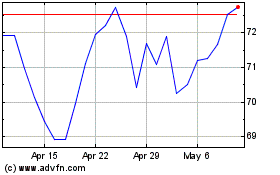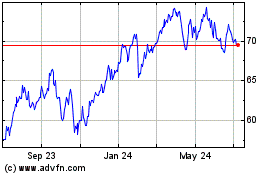Judge To Hear MetLife Challenge
February 10 2016 - 3:02AM
Dow Jones News
(FROM THE WALL STREET JOURNAL 2/10/16)
By Ryan Tracy
A central part of the 2010 Dodd-Frank financial law is about to
get its own stress test.
MetLife Inc. will try to persuade a federal judge Wednesday that
it shouldn't be designated a "systemically important financial
institution," in the first court hearing of a case with potential
either to curtail or to solidify the law's reach. A ruling is
likely months away.
The company wants the court to nullify its SIFI label -- a tag
the law created for financial firms that pose a risk to the economy
and must receive stricter federal oversight. But its broad legal
attack also could hamstring the Financial Stability Oversight
Council, the regulatory group created by Dodd-Frank to identify
risky activities and financial firms, by overturning one of its
most significant accomplishments.
MetLife, the largest U.S. life insurer by assets and known for
its smiling Snoopy mascot, has hired a lawyer with a bulldog track
record of overturning Dodd-Frank rules in court: Eugene Scalia, a
partner at Gibson Dunn & Crutcher LLP and a son of Supreme
Court Justice Antonin Scalia.
The lawsuit, filed in January 2015, stems from a 9-1 vote by the
oversight council in December 2014 to designate MetLife as a SIFI,
sending the company to the Federal Reserve for potentially stiff
capital and other requirements that have yet to be determined.
MetLife is the first SIFI to sue the oversight council. If it
succeeds in upending its SIFI designation, it may not be the last.
Three other SIFIs -- insurers American International Group Inc. and
Prudential Financial Inc. and General Electric Co.'s financing arm,
GE Capital -- are watching the case closely and would likely mount
their own challenges if MetLife prevails.
Already, the tougher regulation expected to come with SIFI
status is causing major changes at GE and MetLife, and possibly
AIG. In April 2015, GE made one of the biggest strategic moves in
its history by laying plans to get out of the banking business --
at the heart of its SIFI designation -- and refocus on its
industrial operations.
Last month, MetLife announced a plan driven by both strategy and
regulatory reasons to divest itself of a chunk of its operations so
that it could be small enough to avoid the SIFI tag.
AIG is resisting a proposal by activist investor Carl Icahn to
break into three parts as a way to shed its SIFI designation,
saying such a split isn't in shareholders' best interests.
A legal victory for MetLife could be a defining moment,
signaling that regulatory restrictions for those firms will
diminish.
An FSOC victory, on the other hand, would protect what
Dodd-Frank proponents consider a major accomplishment of the law:
extending broad federal supervision to major financial firms that
operated before the financial crisis without a regulator watching
over their consolidated operations.
"If the court adds new obligations or makes it harder for FSOC
to" designate SIFIs, "it would be undoing, rewriting or undermining
arguably the most significant part of Dodd-Frank," said Robert
Jackson, a Columbia University law professor who worked at the
Treasury Department during the development of the law. Mr. Jackson
filed a legal brief last year supporting FSOC.
A decision by Judge Rosemary M. Collyer of the U.S. District
Court for the District of Columbia likely would be appealed by the
losing side, so her opinion isn't the last chapter in the case.
Judge Collyer, appointed to the court by President George W. Bush,
doesn't have an ideological reputation.
---
Leslie Scism contributed to this article.
(END) Dow Jones Newswires
February 10, 2016 02:47 ET (07:47 GMT)
Copyright (c) 2016 Dow Jones & Company, Inc.
MetLife (NYSE:MET)
Historical Stock Chart
From Mar 2024 to Apr 2024

MetLife (NYSE:MET)
Historical Stock Chart
From Apr 2023 to Apr 2024
